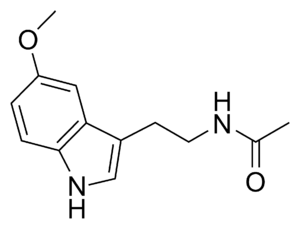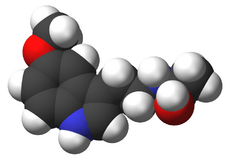Melatonin facts for kids
Melatonin is a natural hormone that helps your body get ready for sleep. It's like a tiny conductor in your brain, guiding your body towards bedtime. Melatonin helps make sure you get a good night's rest.
Contents
What is Melatonin?
Melatonin is a hormone made mostly by the pineal gland. This is a small gland found deep inside your brain. You can think of the pineal gland as a tiny light switch operator. When it gets dark, this operator flips the switch. Then, the pineal gland starts making melatonin.
How Does Melatonin Work?
Melatonin tells your brain and body that it's time to sleep. It doesn't force you to sleep. Instead, it creates a calm and relaxed feeling. This makes it much easier to drift off. Here's how it works:
- Darkness starts melatonin: When the sun goes down, your eyes send a message to your brain.
- Pineal gland gets active: Your brain then tells the pineal gland to start making melatonin.
- Melatonin levels rise: As more melatonin goes into your blood, you start to feel sleepy.
- Body temperature drops: Melatonin also helps lower your body temperature. This is a natural step before sleeping.
- Time to sleep: With your body relaxed and cooler, you are ready to fall asleep!
- Light stops melatonin: When the sun comes up, your eyes send a new message to your brain.
- Pineal gland slows down: Your brain tells the pineal gland to stop making melatonin.
- Melatonin levels fall: As melatonin levels drop, you start to feel awake.
Melatonin and Your Sleep Clock
Melatonin is super important for your sleep-wake cycle. This cycle is also called your circadian rhythm. It's like your body's own natural clock. This clock tells you when to sleep and when to wake up. Melatonin helps keep this clock running smoothly every day.
Things That Change Melatonin Production
Many things can affect how much melatonin your body makes:
- Light exposure: Light is the biggest factor. Bright light, especially blue light from screens, can stop melatonin production. This makes it harder to fall asleep.
- Age: As people get older, their bodies tend to make less melatonin.
- Time of year: During winter, days are shorter. Some people might make more melatonin then. This can make them feel sleepy.
- Health conditions: Some health problems and medicines can also change melatonin levels.
Melatonin Supplements
You can also find melatonin as a supplement. It comes in pills, gummies, or liquids. These supplements can be helpful in certain situations:
- Jet lag: When you travel across time zones, your sleep-wake cycle can get messed up. Melatonin supplements can help reset your internal clock.
- Shift work: People who work at night might find it hard to sleep during the day. Melatonin can help them manage their sleep schedule.
- Delayed sleep phase syndrome: This condition makes it hard to fall asleep at a normal bedtime. Melatonin can help shift the sleep time earlier.
- Insomnia: Some people have insomnia, which means they have trouble falling or staying asleep. Melatonin supplements might help them.
Always talk to a doctor before giving melatonin supplements to a child.
Tips for Making Natural Melatonin
You can do many things to help your body make its own melatonin. This is often better than just taking supplements:
- Have a regular sleep schedule: Go to bed and wake up at the same time every day. Do this even on weekends.
- Create a relaxing bedtime routine: Before bed, try a warm bath, reading a book, or listening to calm music.
- Make your bedroom dark, quiet, and cool: These conditions are best for good sleep.
- Limit screen time before bed: The blue light from phones and computers can stop melatonin. Try to turn off screens at least an hour before bedtime.
- Get regular exercise: Being active can help you sleep better. But avoid exercising too close to bedtime.
- Eat a healthy diet: Eating balanced meals can support healthy sleep patterns.
- Get sunlight during the day: Being in sunlight helps your body's sleep-wake cycle work well.
Fun Facts About Melatonin
- Melatonin is found in some foods. These include cherries, grapes, and tomatoes.
- Plants and animals also produce melatonin.
- Dr. Aaron Lerner first discovered melatonin in 1958.
- It is sometimes called the "hormone of darkness." This is because your body makes it when it's dark.
- Melatonin does more than just help with sleep. It also helps your immune system and acts as an antioxidant.
Images for kids
See also
 In Spanish: Melatonina para niños
In Spanish: Melatonina para niños
 | Dorothy Vaughan |
 | Charles Henry Turner |
 | Hildrus Poindexter |
 | Henry Cecil McBay |





